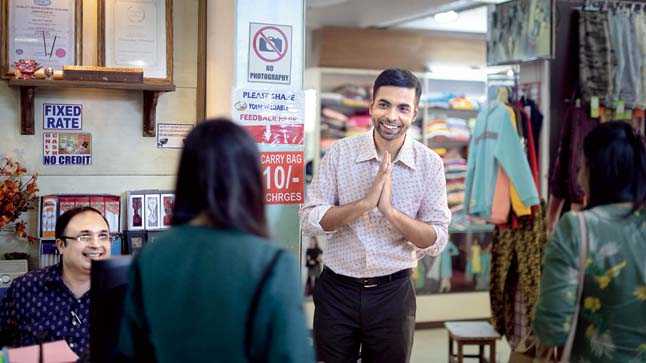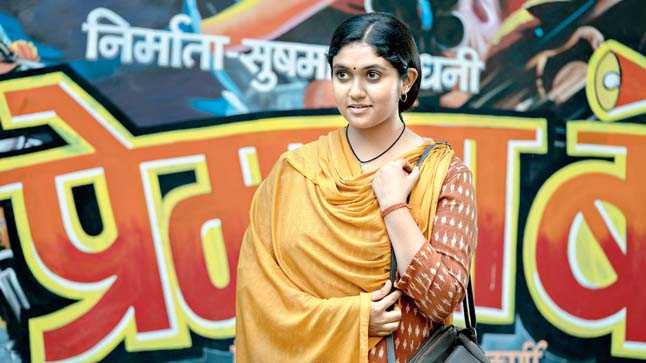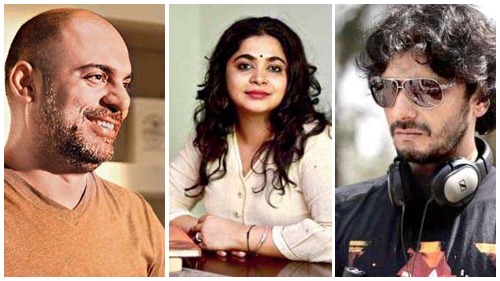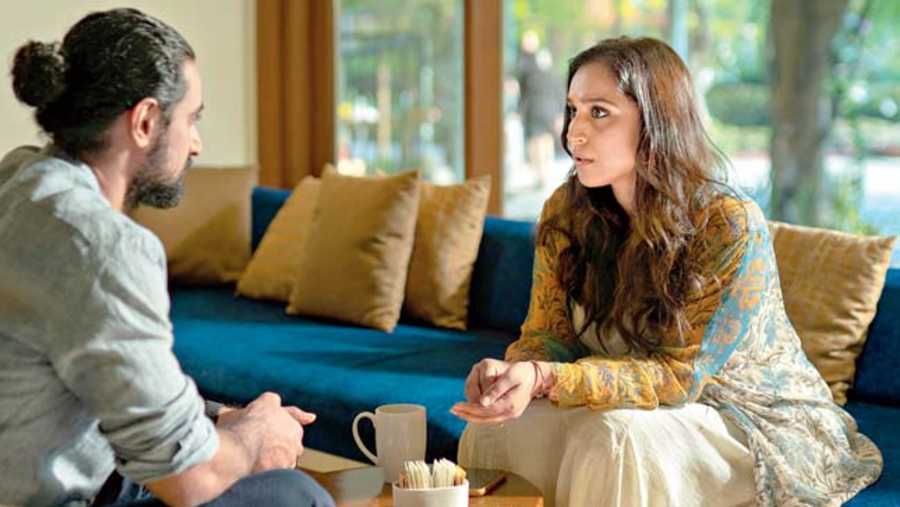Ankahi Kahaniya, a three-in-one anthology based on the theme of unconventional and untold love, is the latest in the format from the Netflix stable. Directed by Abhishek Chaubey (Udta Punjab, Sonchiriya), Saket Chaudhary (Pyaar Ke Side Effects, Hindi Medium) and Ashwiny Iyer Tiwari (Bareilly Ki Barfi, Panga), the anthology stars a rich ensemble comprising Kunal Kapoor, Abhishek Banerjee, Zoya Hussain, Nikhil Dwivedi, Palomi, Rinku Rajguru and Delzad Hiwale, and premieres on the streaming platform on September 17.
The Telegraph chatted exclusively with the three film-makers to know what interests them about the anthology format, their favourite love stories and what they admire in each other as storytellers.
To be honest, the moment I heard about Ankahi Kahaniya, I went ‘Oh no, another anthology?!’ But then I watched the trailer and found it to be very promising. What made you want to make this and what do you think of the anthology format as a whole?
Abhishek Chaubey: I think anthologies should be around. During our growing up years, Doordarshan had shows like Darpan and Katha Sagar, which aired one episode a week and the best actors and the best directors of that era were part of these shows. We kind of missed that when satellite television came in. Now, thanks to Netflix and OTT, we are getting an opportunity to go back and watch those kinds of stories again. It’s like picking up a book of short stories. Earlier, we didn’t know how to monetise the short film format and these are now getting a platform like Netflix. It’s also very liberating for film-makers to be free of the two-hour format and explore storytelling in other ways.
When it comes to Ankahi Kahaniya, I had a story (based on a story named Madhyantara) and I was looking for an opportunity to make it. I lucked out when Ashi Dua (producer) walked into my office and offered me to be a part of this anthology of love stories. It was then that I gave her the script because I really wanted to make this film. It’s a very personal story, starring Rinku Rajguru and Delzad Hiwale.
Saket Chaudhary: As film-makers who work within the mainstream, one doesn’t get that many opportunities to try out ideas. Just like writing a novel requires a different kind of skill from writing a short story, directing a feature film needs a certain skill and most often, we don’t get the chance to explore shorter format ideas. In that sense, anthologies are a great format, born out of streaming platforms.
I have written, but I have never really made a drama. So Ankahi Kahaniya sort of became an opportunity for me to write a dramatic love story (starring Kunal Kapoor, Zoya Hussain and Nikhil Dwivedi) instead of a comic love story. That opportunity is a privilege that I have got out of this eruption of anthologies. So yes, I am grateful.
Ashwiny Iyer Tiwari: I always wanted to be part of an anthology. I just jumped at this because I knew I would get to explore a different side of film-making and make a story which would help me rediscover some nuances that go missing while directing in the long format. Making a short film enables film-makers to put in moments that give you that little piece of joy or try new camera movements or new things in terms of story and characters.... This gave me the joy and passion of film-making in its purest form. All the biggest novelists of the world also write short stories. Sherlock Holmes is present in both long and short formats.

Abhishek Banerjee in the film helmed by Ashwiny Iyer Tiwari Sourced by the correspondent
As a maker, the art of falling in love with film-making and with telling different kinds of stories gives us joy. In making this short story (starring Abhishek Banerjee), I could experiment with cinematography, characters, new-age technology....
There are endless love stories in the long format in this world. But every time you see a love story, you find something new in it. So I do believe that it’s not about what you say, it’s about how you say it. There are only nine emotions, but you can depict them in multiple ways.
Which love stories have impacted you the most?
Ashwiny: Abhimaan is one of my favourite love stories. I am a big fan of Mr (Amitabh) Bachchan and so any film of his in which there is a solid love story I really like. The Notebook is another love story I like. I love the classic rom coms. Lamhe is a favourite. I think music defines a love story for me.
Saket: The earliest love story I remember liking is Muqaddar Ka Sikandar. When you are a kid and you see someone of your age exploring the emotion of love, it stays in your memory. As I got older, When Harry Met Sally... is a classic in the romantic comedy genre. And Wong Kar-wai’s In the Mood for Love.
Abhishek: For me, it’s Wong Kar-wai as well. I have been a longtime fan of his Chungking Express. Claude Lelouch’s A Man and a Woman is another love story I love. I prefer making gangster and violent films, everyone knows that! (Laughs) But contrary to popular belief, I like watching love stories as well. There is a film called Sara Aakash, which kickstarted the parallel cinema movement in Hindi cinema. That’s a wonderful love story.

Abhishek Chaubey directs Rinku Rajguru in his short film
What is it that you admire about each other as storytellers?
Ashwiny: I want to make a gangster film like Chaubey does! (Everyone laughs) Please give me some of your scripts! For Saket, I feel making a simple idea big and then getting the element of humour in is his forte. The idea in Hindi Medium could have gone anywhere, but the way he wrote it and directed it, pulled the audience in.
Abhishek: I watched Hindi Medium with Irrfan bhai... he had called me for the screening and I really admired the social commentary that Saket brought into that film, but with his tongue in his cheek and with empathy for his characters. That’s something I always aspire to do... to say something important with a lightness of touch. I am a big fan of Ashwiny’s film Panga. I thought it had very clear thinking and was beautifully designed and very well shot with some great performances.
Saket: I love the way Ashwiny writes her female characters. I remember watching Nil Battey Sannata and that had come before Hindi Medium, and I was like, ‘Arre, meri picture se pehle ek education ki picture aa gayi hain. I have to go and watch it!’ (Everyone laughs) In all her films, the depth she invests in her characters, especially the female characters, is something I admire.
Ashwiny: Aisa mat bolo yaar... koi male actor mere saath kaam hi nahin karega! (Laughs)
Saket: There are shots in Chaubey’s films that just stay with you. In Udta Punjab, it’s the opening shot of that discus throw across the border. In his short story for Ray, so much of what he says is told through spectacular visuals. His films are also about characters saying so much even while saying nothing.

(L-R) Film-makers Saket Chaudhary, Ashwiny Iyer Tiwari and Abhishek Chaubey
Is there an ‘ankahi kahani’ — from history, mythology, an urban legend, something you’ve heard — that you wish to bring alive on screen?
Abhishek: India is a country of untold stories. We need to focus on those stories and those parts of society that we don’t talk enough about.
Saket: One of the most told, and yet unfortunately, stories that we need to keep telling, are love stories. Because this is a country where love is still considered a crime in some sections of society. As a film-maker, it fascinates you, but as a person, it horrifies you.
Ashwiny: In every corner of our country, I am sure there would be one untold story that someone would be eager to talk about. And as storytellers, we need to tap into that — whether it’s an untold crime story, an untold love story or an untold biography.










